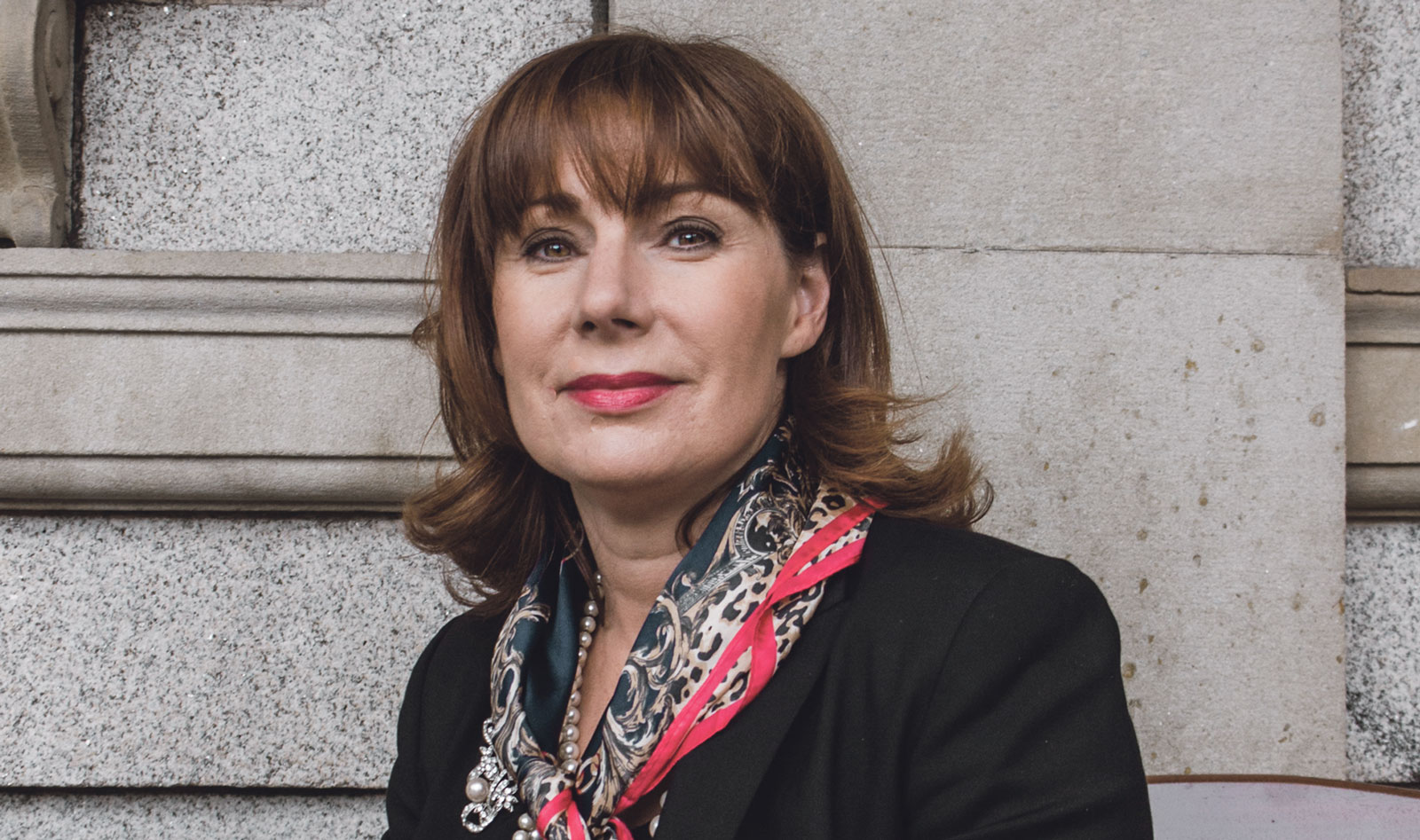As I enter Leinster House, I can’t help but notice that the facade is under construction. Josepha Madigan’s Fine Gael party has been working on a similar facelift in recent months, in an attempt to rebuild and rebrand itself in an attempt to escape from its recent past. While the Irish public remain sceptical of Leo Varadkar, the 38-year-old Taoiseach has attracted wide-eyed profiles and column inches from the international media as the changing face of modern Ireland. The new guard, it seems, is offering the country a new-look Fine Gael. But whether that new look is the finished product or is simply under construction remains to be seen.
Passing through the doors, the unavoidable construction outside leaves no trace as I enter the building. Oil paintings of past parliamentarians hang on the walls and a carpeted staircase with marble banisters leads to the massive wooden doors of the Dáil chamber. Continuing through the cream coloured corridors we settle in the Dáil bar, a location in stark contrast to the rest of the building.
Josepha Madigan is one of that new generation of Fine Gael TDs. Nearly 10-years older than her youthful party leader, Madigan is a comparative minnow when it comes to party politics. The Dublin politician, elected in 2016, has yet to even defend her seat but is already one of the most recognisable names of our much-heralded but rarely spotted “new” politics.
Madigan, sharply dressed, sits across from me. It was only a few months ago, with the eyes of the world watching her, she stood in the Dáil to second the nomination of Varadkar to Taoiseach. It was a “privilege”, Madigan claims. Then, Madigan told Varadkar that “for this beloved country of ours, you are the right person at the right time”.
Madigan, a Trinity graduate and former family lawyer, is already outflanking party colleagues to whom she might be considered a junior
The only way is up, it might seem. Our interview, on a quiet Thursday afternoon, takes place before the Oireachtas returns from its summer recess. Still though, there’s a sense of preoccupation beneath her calm exterior. Madigan, a Trinity graduate and former family lawyer, is already outflanking party colleagues to whom she might be considered a junior.
Her election in 2016 came after having only been a councillor in the Dún Laoghaire-Rathdown County Council for two years, having beaten out Alan Shatter, a heavy hitter of Fine Gael at the time, by nearly 1,000 votes. In late 2016, she toured Trinity during Freshers’ Week with the then-Taoiseach Enda Kenny. A notable show of confidence in Madigan became clear when she was asked to help in talks to form the current government, having only been in the job three weeks.
One of the more light-hearted stories from the general election was Madigan’s novel, Negligent Behaviour, which generated frothy newspaper headlines introducing her as the author of a novel detailing the exploits of Helene McBain, a South Dublin solicitor well known in the professional and sexual world of Celtic Tiger Dublin. Despite settling for sex “only on a not infrequent basis”, her satisfactory life is changed dramatically when she encounters three men – Barnaby the accountant, Dan the businessman and Murdoch the senior counsel – who impact her life in their own way. Becoming romantically intertwined with two of the three men, McBain also becomes embedded in the inner machinations of managing partner Andrew Peterson.
Madigan protests that here is no connection between her and her protagonist. She sought to write the book to expose the malpractice that she had seen in her career, she claims. When asked if there are more novels in the pipeline, she seems wary. ”I have written another book which is 100,000 words, but I’ve only re-edited 20,000 words and intended over the month of August to get to that, but I was working in the budgetary committee, so it had to go to the wayside… I have no idea if it will ever see the light of day, so I would hold my powder on that.”
She attributes this former career in family law as to what gives her a competitive edge. “Family law is adversarial by nature, so going into politics was a great background to have from that perspective.” She expects to get these questions and knocks them down with relative ease.
I want to know why she switched from law to politics. “I am going from a law practice-r to a law maker. So there is a distinct difference, and I take it very seriously. But it’s a change and it’s enjoyable.”
Her involvement with the Fine Gael party itself is of particular interest. Her father, Patrick Madigan, was a councillor for Fianna Fáil and then ran as an Independent, having fallen out with the party due to the failure of Charles Haughey to dismantle the residential property tax in 1994, a tax he claimed was the “most obnoxious tax levied on the Irish people”.
Yet neither becoming a member Fianna Fáil, nor running as an Independent appealed to Madigan. “Fine Gael is more progressive as a party, maybe more liberal minded, and more inclusive, therefore I felt that it fitted better with my views”, she believes.

Her father died two weeks before she was elected into office. At this moment Madigan begins to reflect. He never saw her “elected to anything which is a real shame”, she considers. Yet she continues to credit him with raising her in a politically oriented household.
He never saw her “elected to anything which is a real shame”, she considers. Yet she continues to credit him with raising her in a politically oriented household
Madigan enjoys the work because she feels she is really making a difference. She has submitted a private members’ bill which received cross-party support which would reduce the time limit for divorce from four years to two. The government has accepted the proposal and the bill has been sent to the Oireachtas Committee on Justice and Equality. She hopes this will result in a referendum within the next year. “So if I get that through, that would be huge advantages for thousands of people throughout Ireland who are stuck in limbo land. So to be able to do that, if I do one good thing, and I do that, then I’ve achieved an awful lot for people.”
In addition to being asked to help form the government with a relatively short political tenure, she has been appointed Chair of the Committee on Budgetary Oversight. She emphasises that the committee is a collection of various politicians and the importance of the committee, which is working assemble a report to be sent to the Minister of Finance, Paschal Donohoe.
Creating a proposal for Donohoe is a difficult endeavour with the current state of affairs across the Irish Sea. The shadow cast by Brexit over the future of trade in Europe, means that creating a budget is near impossible. The UK is Ireland’s primary trade partner, so any threat to that relationship will create huge losses for the government.
“Nigel Farage, Boris Johnson, et al brought us to the edge of the cliff or precipice and may not be in the position to roll us back from that. But yes, there may well be implications for trade. There’s a huge food export there between Britain and the UK and dealing with Canada, so it’s really going to be up to the UK what sort of trade deals, or if they have a transitional trade deal in place before March 2019. So we’re going to have to make sure of that.”
The principles that Madigan values in Fine Gael stem from her belief that Fine Gael is a young political party. Looking at the Fine Gael front-bench would show that she might have a point, with several Ministers covering various portfolios, from health to housing, all under the age of 40.
A younger government, Madigan says, will better address issues that directly impact the youth of Ireland
A younger government, Madigan says, will better address issues that directly impact the youth of Ireland. In order to achieve this, Madigan believes Fine Gael will have to “make some influential change on a practical level for people”, pointing specifically to health and housing.
These issues do not have simple solutions, however. Madigan acknowledges this by stating that the only way to tackle issues of this size is to go at it “part by part” and not to try to change everything all at once. Yet it might not be enough to go at issues part by part, and certain issues, not the least of which are the two she specifically mentioned, require drastic overhauls. This is especially true when talking about the housing and homelessness crisis.
“It’s a historic problem, you know, whether we’ll ever completely eradicate homelessness, I don’t know. I think it’s going to be very difficult to achieve that, in any society, civilised or not. But we have to make our best endeavours. I do believe Eoghan Murphy is really striving to do that. He’s having an emergency summit in the next few days with all of the key stakeholders to see what are we not doing that we can do better.”
She shows her faith in Murphy by pointing to the Rapid Build Housing initiative, which was introduced by former Minister of Housing Simon Coveney in an attempt move homeless families out of hotels and off the streets and into specific housing residences for underprivileged families. However, the timeline he gave at the start of the initiative has had to be changed multiple times, leaving many families in a state of confusion. Murphy’s opportunity to fix this conundrum has so far had similarly little impact.
The coming year will see a referendum on the eighth amendment. It’s an issue that’s everywhere these days and the coming months will see marches, protests and frantic campaigning as both sides line up for one of the most significant votes in recent years.
“I do think that the eighth should be repealed. I am pro-choice”, Madigan says. “I don’t like the idea of abortion. I think it must be a very difficult situation for any woman to make, but having said that I don’t think I have the right to decide that for any other woman or decide to have her own bodily autonomy.”
We’re going to have to be very cautious with what sort of wording that we use and that we have as tight as we can so that the Irish people understand exactly what they’re voting for
Madigan is of the view that the eighth amendment should be replaced – this should be the topic of any referendum vote. “We’re going to have to be very cautious with what sort of wording that we use and that we have as tight as we can so that the Irish people understand exactly what they’re voting for.”
One of our early introductions to Madigan, well before she was an up-and-coming TD, were her comments on the Traveller community. In her campaign literature, she branded a halting site in Mount Anville, close to her home, a “dreadful waste of taxpayer money”. She still maintains that position. “I was never anti-Traveller and I’ve clarified my comments on that… my only point is that I don’t see why people should be housed, whether they’re Travellers or whether they’re anybody else, in the most expensive plot in Ireland, when those monies could be used to house more families from other backgrounds.”
Despite this, Madigan’s rise has seemed relatively seamless. For someone relatively late to the political game, she seems to know the ropes better than professional politicians often scorned by the public. Perhaps it’s in her blood or maybe it stems from her former career as a lawyer. Whatever the case it seems this new face in the Dáil bar is going to get even more familiar.







